
Aucun dossier informatif complémentaire concernant Spring Awakening
Aucun dossier informatif complémentaire concernant Spring Awakening
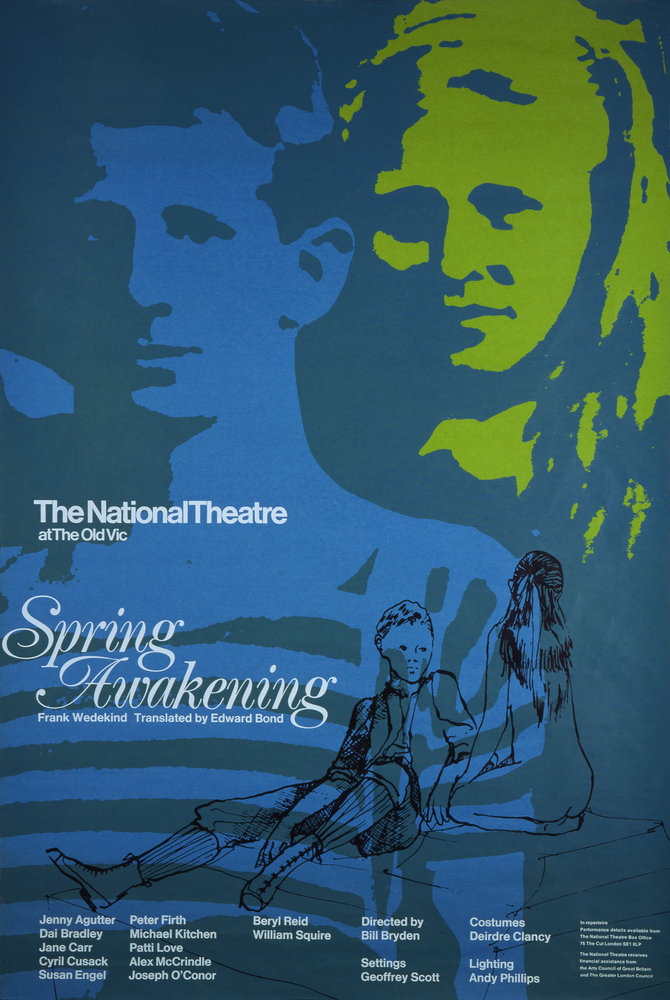
Version 1
Spring Awakening (1974-05-Old Vic-NT-London)
Type de série: RevivalThéâtre: Old Vic (Londres - Angleterre) Durée : 3 mois 2 semaines Nombre : 49 représentationsPremière Preview : Inconnu
Première: 28 May 1974
Dernière: 14 September 1974Mise en scène : Bill Bryden • Chorégraphie : Producteur : Star(s) : Avec: Peter Firth, Michael Kitchen, Dai Bradley, Christopher Guard, Veronica Quilligan, Jane Carr, Jenny Agutter, Patti Love, Rupert Frazer, Joseph O'Conor, Susan Engel, Beryl Reid, William Squire, Cyril Cusack
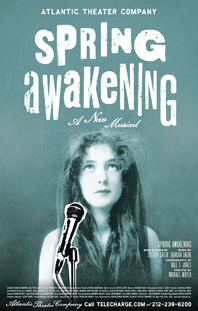
Version 2
Spring Awakening (2006-06-Linda Gross Theater-Off Broadway)
Type de série: OriginalThéâtre: Linda Gross Theater (Broadway (Off) - Etats-Unis) Durée : 1 mois 3 semaines Nombre : Première Preview : 15 June 2006
Première: 15 June 2006
Dernière: 05 August 2006Mise en scène : Michael Mayer • Chorégraphie : Bill T Jones • Producteur : Star(s) : Avec: Jonathan Groff (Melchior), Lea Michele (Wendla), John Gallagher, Jr. (Moritz), Lauren Pritchard (Ilse), Frank Wood (Adult Men), Mary McCann (Adult Women), Lilli Cooper (Martha), Skylar Astin (Georg), Gideon Glick (Ernst), Brian Charles Johnson (Otto)Commentaires longs: Awards Won: 2006 Callaway Award
Choreography, Bill T. Jones
2007 Lucille Lortel Award
1. Outstanding Musical
2. Outstanding Lighting Design, Kevin Adams
2007 Drama League Award
Distinguished Production of a Musical
2007 Drama Critics' Circle Award
Best Musical, Duncan Sheik and Steven Sater
2007 Obie Award
Choreography, Bill T. Jones
2007 Henry Hewes Design Award
Lighting Design, Kevin Adams
2007 Drama Desk Awards
1. Outstanding Musical
2. Outstanding Director of a Musical, Michael Mayer
3. Outstanding Music, Duncan Sheik
4. Outstanding Lyrics, Steven Sater
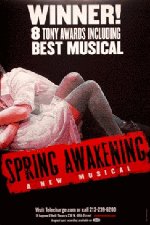
Version 3
Spring Awakening (2006-11-Eugene O'Neill Theatre-Broadway)
Type de série: Original BroadwayThéâtre: Eugene O'Neill Theatre (Broadway - Etats-Unis) Durée : 2 ans 1 mois 1 semaine Nombre : 29 previews - 888 représentationsPremière Preview : 16 November 2006
Première: 10 December 2006
Dernière: 18 January 2009Mise en scène : Michael Mayer • Chorégraphie : Bill T Jones • Producteur : Star(s) : Avec: Jonathan Groff (Melchior), John Gallagher Jr. (Moritz), Lea Michele (Wendla), Skylar Astin (Georg), Lilli Cooper (Martha), Gideon Glick (Ernst), Brian Charles Johnson (Otto), Christine Estabrook (Adult Women), Lauren Pritchard (Ilse), Phoebe Strole (Anna)Commentaires : Frank Wedekind’s once-banned 1891 play “Frühlings Erwachen” was given a rock-ballad-musical treatment, and opened off-Broadway in May 2006, and on Broadway itself in December 2006 following much critical acclaim. For a musical dealing with adolescent ignorance and confusion, homosexuality, peer pressure, teen suicide, abortion, masturbation and adult hypocrisy, it received an astonishing eleven Tony Award nominations, winning eight, including Tonys for best musical, direction, book, score and featured actor. It ended its Broadway run on January 18, 2009 following 888 performances and 29 previews
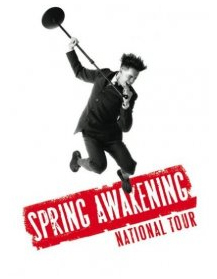
Version 4
Spring Awakening (2008-08-National Tour)
Type de série: US TourThéâtre: US Tour ( - Etats-Unis) Durée : 1 an 9 mois 1 semaine Nombre : Première Preview : 15 August 2008
Première: 15 August 2008
Dernière: 23 May 2010Mise en scène : Michael Mayer • Chorégraphie : Bill T Jones • Producteur : Star(s) :
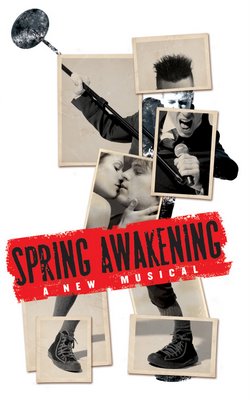
Version 5
Spring Awakening (2009-02-Lyric Hammersmith-London)
Type de série: Original LondonThéâtre: Lyric Hammersmith (Londres - Angleterre) Durée : 1 mois 1 semaine Nombre : Première Preview : 23 January 2009
Première: 03 February 2009
Dernière: 14 March 2009Mise en scène : Michael Mayer • Chorégraphie : Bill T Jones • Producteur : Star(s) : Avec: Charlotte Wakefield (Wendela), Aneurin Barnard (Melchior), Iwan Rheon (Moritz), Lucy Barker (Ilse), Sian Thomas (Mother/ Women), Richard Cordery (Headmaster/Men), Evelyn Hoskins, Natasha Barnes, Hayley Gallivan, Edd Judge, Jamie Blackley, Harry MacEntire, Jos SlovickCommentaires : The London Cast won 4 awards at the Laurence Olivier Awards 2010. Aneurin Barnard won an award for best actor in a musical/entertainment. Iwan Rheon won an award for best supporting role in a musical/entertainment. Spring Awakening London as a show won best musical and best soundPresse : ***** 'Here it is at last, the answer to one's prayers - a new musical bursting with ambition and achievement... IT'S A BLAST.' Daily Telegraph
***** 'Breathtakingly, outrageously brilliant.' thelondonpaper
***** 'AN ABSOLUTE MUST-SEE and by far the best new musical in London for ages.' whatsonstage.com
***** 'It ticks enough boxes for excellence - acting, design, choreography, theatrical innovation, emotional power, even the lighting - to be A MUST SEE.' Daily Express

Version 6
Spring Awakening (2009-03-Novello Theatre-London)
Type de série: West End TransferThéâtre: Novello Theatre (Londres - Angleterre)
Durée : 2 mois Nombre : Première Preview : 21 March 2009
Première: 26 March 2009
Dernière: 30 May 2009Mise en scène : Michael Mayer • Chorégraphie : Bill T Jones • Producteur : Star(s) : Avec: Charlotte Wakefield (Wendela), Aneurin Barnard (Melchior), Iwan Rheon (Moritz), Lucy Barker (Ilse), Sian Thomas (Mother/ Women), Richard Cordery (Headmaster/Men), Evelyn Hoskins, Natasha Barnes, Hayley Gallivan, Edd Judge, Jamie Blackley, Harry MacEntire, Jos SlovickCommentaires : The London Cast won 4 awards at the Laurence Olivier Awards 2010. Aneurin Barnard won an award for best actor in a musical/entertainment. Iwan Rheon won an award for best supporting role in a musical/entertainment. Spring Awakening London as a show won best musical and best soundPresse : ***** 'Here it is at last, the answer to one's prayers - a new musical bursting with ambition and achievement... IT'S A BLAST.' Daily Telegraph
***** 'Breathtakingly, outrageously brilliant.' thelondonpaper
***** 'AN ABSOLUTE MUST-SEE and by far the best new musical in London for ages.' whatsonstage.com
***** 'It ticks enough boxes for excellence - acting, design, choreography, theatrical innovation, emotional power, even the lighting - to be A MUST SEE.' Daily Express
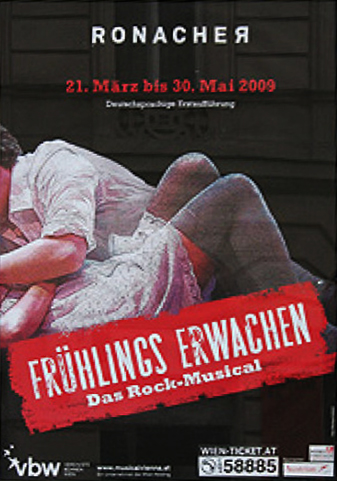
Version 7
Spring Awakening (2009-03-Ronacher Theater-Vienne)
Type de série: RevivalThéâtre: Ronacher (Vienne - Autriche) Durée : 2 mois 1 semaine Nombre : Première Preview : 21 March 2009
Première: 21 March 2009
Dernière: 30 May 2009Mise en scène : Michael Mayer • Chorégraphie : Bill T Jones • Producteur : Star(s) :
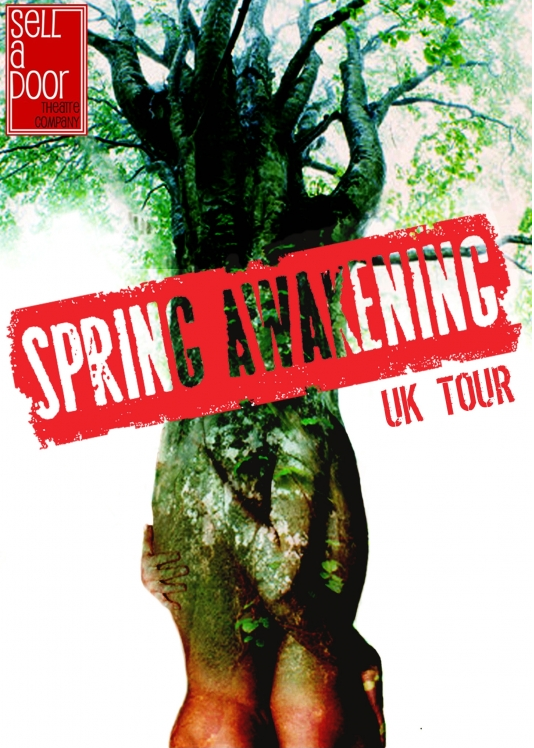
Version 8
Spring Awakening (2011-05-UK Tour)
Type de série: UK TourThéâtre: UK Tour ( - Angleterre) Durée : 1 mois Nombre : Première Preview : 17 May 2011
Première: 17 May 2011
Dernière: 18 June 2011Mise en scène : Pete Gallagher • Chorégraphie : Cressida Carré • Producteur : Star(s) : Avec: Jonathan Eio (Melchior), Billy Cullum (Moritz), Victoria Serra (Wendla), Jill Armour (Ilse), Anna McGarahan (Martha), Jane Stanton (Adult Women), Robert Eyles (Adult Men), James Benn (Hanschen), Zachary Morris (Ernst), Daniel Buckley (Otto)Commentaires : Dates de la tournéeCommentaires longs: 17 Juin 11 au 18 Juin 11 (Playhouse, Norwich), 14 Juin 11 au 15 Juin 11 (The Lowry, Salford), 7 Juin 11 au 12 Juin 11 (Greenwich Theatre, Outer London), 26 Mai 11 au 28 Mai 11 (MacRobert Arts Centre, Stirling), 24 Mai 11 au 25 Mai 11 (Pleasance, Edinburgh), 17 Mai 11 au 21 Mai 11 (Northcott Theatre, Exeter)
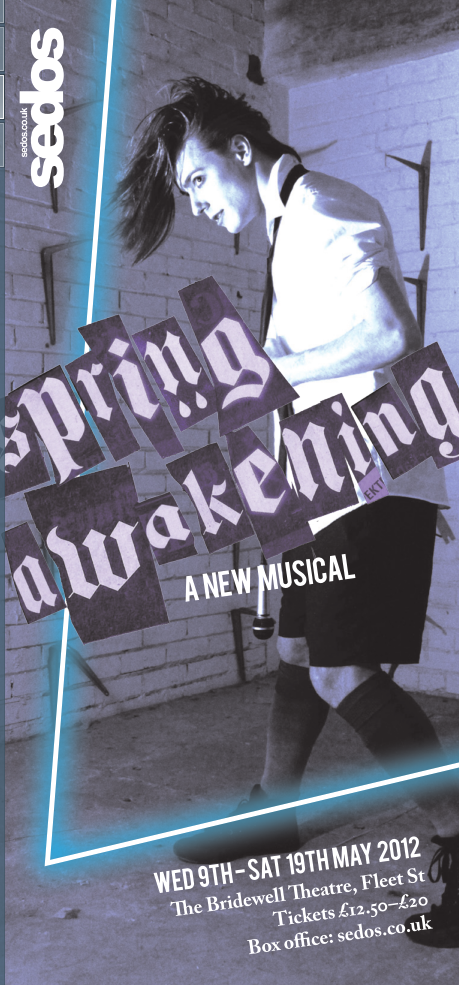
Version 9
Spring Awakening (2012-05-Bridewell Theatre-London)
Type de série: RevivalThéâtre: Bridewell Theatre (Londres - Angleterre) Durée : 1 semaine Nombre : Première Preview : 09 May 2012
Première: 09 May 2012
Dernière: 19 May 2012Mise en scène : Chris Warner • Chorégraphie : Tim Garrad • Producteur : Star(s) : Avec: Joe Penny (Melchior), Anthony Hagan (Moritz), Andrew Newton (Hanschen), David Swain (Ernst), Adrian Hau (Georg), Jason Mackey (Otto), Aisling Ridge (Wendla), Lisa Pilkington (Ilse) Alexandra Demicoli (Martha), Skyla Loureda (Thea), Laura Hope-London (Anna), Jason Thomas Maria Waters, Parry Bates, Matthew Hudson, Victoria Greenway, Laura Manzotti.Presse : "Great news for theatregoers who have craved a new musical with attitude, youthful exuberance and a fresh, gutsy sound." NY Daily News
“Here it is at last, the answer to one's prayers - a new musical, bursting with ambition and achievement…with the best original pop/rock score since Hair.” Telegraph
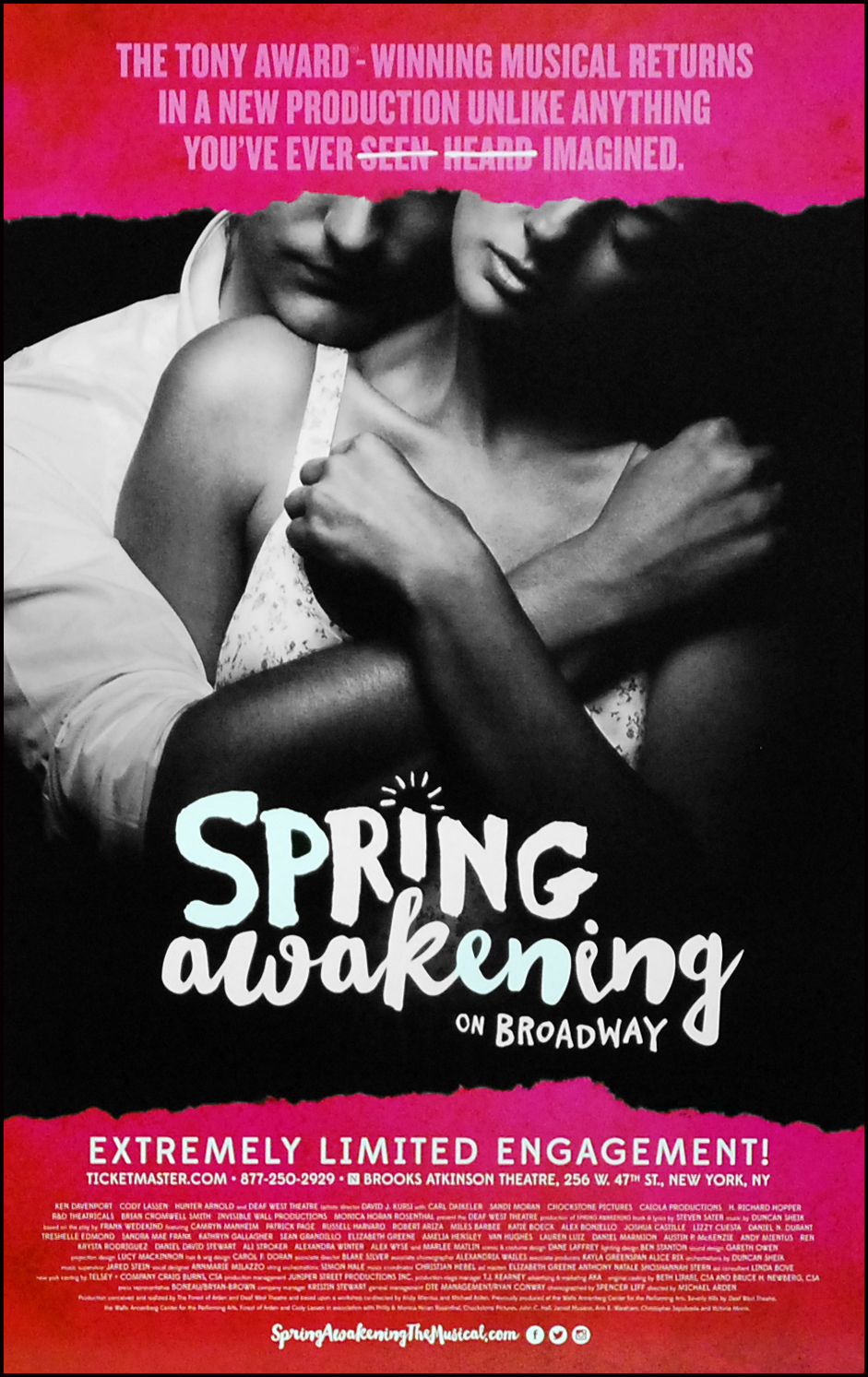
Version 10
Spring Awakening (2015-09-Brooks Atkinson Theatre-Broadway)
Type de série: RevivalThéâtre: Brooks Atkinson Theatre (Broadway - Etats-Unis) Durée : 3 mois 4 semaines Nombre : Première Preview : 08 September 2015
Première: 27 September 2015
Dernière: 24 January 2016Mise en scène : Michael Arden • Chorégraphie : Spencer Liff • Producteur : Star(s) : Avec: Miles Barbee (Otto), Katie Boeck (Voice of Wendla), Alex Boniello (Voice of Moritz), Joshua Castille (Ernst), Daniel Durant (Moritz), Treshelle Edmond (Martha), Sandra Mae Frank (Wendla), Kathryn Gallagher (Voice of Martha), Sean Grandillo (Voice of Otto), Elizabeth Greene (Adult Woman), Russell Harvard (Adult Man), Amelia Hensley (Thea), Lauren Luiz (Heidi/Voice of Thea), Austin McKenzie (Melchior), Andy Mientus (Hanschen), Patrick Page (Adult Man), Krysta Rodriguez (Ilse), Daniel David Stewart (Voice of Ernst), Ali Stroker (Anna), Alexandria Wailes (Adult Woman), Alexandra Winter (Gretl), Alex Wyse (Georg)Presse : Les critiques sont excellentes:
"Any qualms theater-lovers might have about this being a premature, whiplash-inducing revival — the original closed in 2009, after all — will vanish like frost in strong sunlight when the young cast of both hearing and deaf actors floods the stage." Charles Isherwood for New York Times
"In Deaf West's exhilarating reboot of the moody and stirring 2007 Tony winner by Duncan Sheik and Steven Sater, the repressed and rudderless kids are lifting more than their voices. They’re also raising their hands to express themselves — and casting a whole new spell." Joe Dziemianowicz for New York Daily News
"Michael Arden’s production for the Deaf West company skillfully integrates American Sign Language with Spencer Liff’s choreography, so the doubling of actors doesn’t get in the way of the storytelling." Elisabeth Vincentelli for New York Post
"What’s good about this Spring are the enduringly powerful songs and several strong performances: Frank and Durant do lovely work, and Russell Harvard brings raw, honest emotion to a violently disapproving father. For all of the valid reservations one can have about this experiment, there’s still beauty to admire, if you’re willing to hear." David Cote for Time Out New York
"The result is an exhilarating and fluid hybrid of song, word, dance and sign — and a sheer triumph for director Michael Arden and choreographer Spencer Liff. The songs sit seamlessly in the show, often as brightly lit fantasy sequences that snap back into the grim narrative." Mark Kennedy for Associated Press
"It's an admirable undertaking and I wish I could get behind it. But arriving on Broadway so soon after Michael Mayer's viscerally impactful premiere production won the 2007 Tony Award for best musical, this underpowered, unexceptionally sung post-Glee version seems more of a special presentation than a wholesale reinvention." David Rooney for The Hollywood Reporter
"Deaf West awakens something new in the show, which is not so much a revival as it is a reinvention — although for the next 15 weeks of its limited run at the Brooks Atkinson Theater, the house should remain nearly packed with those happy to find the Duncan Sheik-scored rock opera back on Broadway in any form." Peter Debruge for Variety
Pas encore de video disponible pour ce spectacle

.png)
.png)




